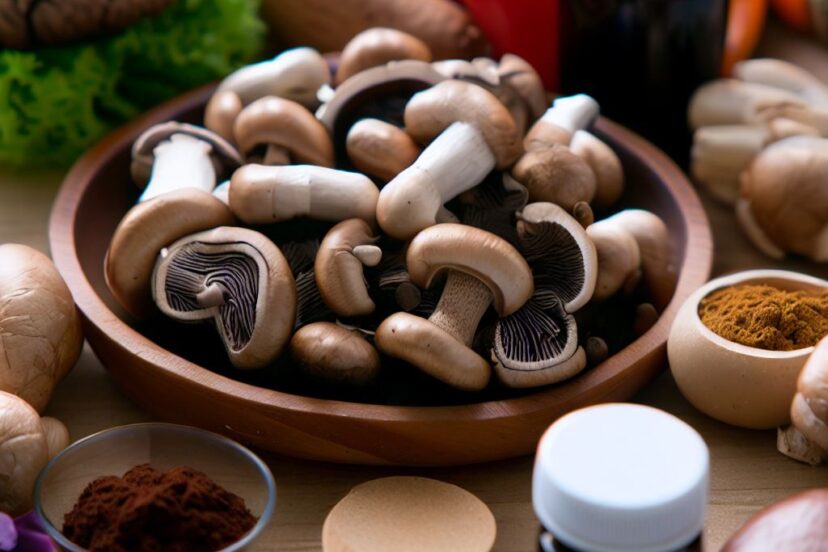Nootropic Mushrooms: Unlocking Mental Clarity
*We may earn a commission for purchases made using our links. Please see our disclosure to learn more.
Nootropic Mushrooms: Unlocking Cognitive Potential Naturally
Nootropic mushrooms have garnered the attention of both the scientific community and individuals seeking to enhance brain health and cognitive function. These natural supplements are believed to offer benefits that include improved memory, focus, and overall cognitive performance. As someone who has explored the realm of nootropics, I can attest to the growing interest in these fungi for their potential to support mental clarity and neuronal health.

Among the variety of nootropic mushrooms, some have stood out for their reported efficacy. Lion’s Mane, Reishi, and Cordyceps are often highlighted for their purported ability to improve mental acuity. These mushrooms contain active compounds that may stimulate nerve growth factor, support neurogenesis, and provide neuroprotective effects.
While anecdotal evidence points to the positive influence of these nootropic mushrooms on brain health, it is crucial to approach their use with a critical eye. It’s important to consider scientific evidence, quality, and correct dosages when choosing nootropic mushrooms as part of a regimen for enhancing cognitive function.
Types of Nootropic Mushrooms

I’m focusing on some of the most recognized nootropic mushrooms, which are renowned for their potential benefits in cognitive health, stress management, and overall well-being.
Lion’s Mane Mushroom
Lion’s Mane (Hericium erinaceus) has gained attention for its potential to stimulate the production of nerve growth factors, thereby supporting brain health. It’s thought that this mushroom may enhance memory and cognitive function.
Reishi Mushroom
Reishi (Ganoderma lucidum) is another mushroom that is highly esteemed for its stress-reducing and immune system-supporting properties. I’ve found it to be associated with benefits like blood sugar regulation and exerting antioxidant effects.
Chaga Mushroom
Known as Chaga (Inonotus obliquus), this variety has a reputation for its high antioxidant content and its ability to support the immune system. It may also have a positive impact on inflammation and contribute to overall health maintenance.
Cordyceps Mushroom
Cordyceps mushrooms, particularly Cordyceps militaris, are traditionally used for increasing energy levels. This mushroom may offer benefits for athletic performance, as well as acting as an antioxidant and supporting heart health.
Maitake Mushroom
Lastly, Maitake (Grifola frondosa) is included for its potential to assist in blood sugar regulation, enhance immune function, and maintain blood pressure and weight within healthy ranges. It might also have a part to play in reducing inflammation and elevating energy levels.
Health Benefits and Cognitive Enhancement

Nootropic mushrooms have gained attention for their ability to support cognitive function, particularly through enhancing memory and learning, alleviating stress and depression, as well as boosting energy and mood.
Supporting Memory and Learning
I understand that certain nootropic mushrooms, specifically Lion’s Mane, are believed to stimulate the production of nerve growth factor (NGF). NGF is crucial for the growth and survival of neurons, which are essential for memory and learning. Research suggests that by promoting neurogenesis, the process of forming new neurons, these mushrooms may enhance cognitive abilities.
Alleviating Stress and Depression with Nootropic Mushrooms
Adaptogens, a class of substances found in nootropic mushrooms like Reishi, help the body resist various stressors. These mushrooms may contribute to balancing stress hormones in the brain, offering a natural approach to mood regulation and stress relief. Their potential antidepressant-like effects are attributed to their ability to combat oxidative stress, a contributing factor in depression.
Boosting Energy and Mood
Cordyceps mushrooms are renowned for their energy-boosting properties. They are believed to enhance ATP production, the body’s primary energy carrier, thus increasing physical stamina and energy levels. Additionally, antioxidants present in these mushrooms may help mitigate oxidative stress, contributing to improved mood and vitality.
Nutritional Composition and Chemistry of Nootropic Mushrooms

In my examination of nootropic mushrooms, I’ve determined that they are rich in biologically active compounds that contribute to their purported health benefits. These include polysaccharides like beta-glucans, antioxidants, and unique compounds such as hericenones and erinacines.
Understanding Polysaccharides and Beta-Glucans
Polysaccharides, namely beta-glucans, are abundant in nootropic mushrooms. Beta-glucans are known for their immune-modulating effects. They’re structured as long chains of glucose molecules, which have been documented to enhance immune function and potentially impart neuroprotective properties. For instance, 1,3 1,6 beta-glucans are of particular interest for their role in supporting brain health.
Antioxidant Properties
The antioxidant profile of nootropic mushrooms is significant. Antioxidants combat oxidative stress by neutralizing free radicals in the body. Regular consumption of mushrooms providing these antioxidant properties may help protect against cellular damage and inflammation, offering anti-inflammatory benefits. Amino acids, such as cysteine and glutamine, also play a part in antioxidant defense, although some processing methods may reduce their content.
Unique Compounds: Hericenones and Erinacines
Nootropic mushrooms contain unique compounds like hericenones and erinacines, which are particularly found in Lion’s Mane mushrooms (Hericium erinaceus). These compounds have been studied for their neurotrophic effects that can stimulate the growth of brain cells and are associated with neuroprotective properties. Research indicates that these substances may bolster cognitive function and possibly regenerate nerve tissue.
Nootropic Mushrooms Usage and Forms of Supplementation

In discussing nootropic mushrooms, it’s essential to consider the available supplement forms, proper dosages, and potential side effects to ensure safe and effective use.
Mushroom Supplements and Extracts
Nootropic mushroom supplements come in various forms. Capsules are among the most common, delivering precise dosages in a convenient form. Powders can be mixed with foods, smoothies, or drinks and offer flexible dosage adjustments. Tinctures are liquid extracts that are taken sublingually (under the tongue) for rapid absorption. The supplements might contain fillers, so I make it a point to choose products that prioritize purity.
Dosage and Consumption Methods for Nootropic Mushrooms
Determining the correct dosage of mushroom supplements is vital for efficacy. It varies by individual needs and mushroom type, for example, Lion’s Mane or Cordyceps. For precise dosing, capsules are often preferred. If I use powders, I make sure to measure them accurately, as per the recommended dosage on the product label or a doctor’s advice.
- Capsules: As directed on the label or 1-2 daily with water.
- Powders: Measure as instructed; mix with food or beverages.
- Tinctures: Use the dropper for dosing; apply under the tongue.
Safety Considerations and Side Effects
While nootropic mushrooms are often safe for many users, it’s my responsibility to stay informed about safety and potential side effects. Common side effects may include digestive discomfort or allergic reactions. Before I start any new supplement, I consider consulting with a healthcare professional, especially if I have existing health conditions or am taking other medications. I check for high-quality products with minimal filler content to avoid unnecessary additives.
- Supplements: Choose those without unnecessary fillers.
- Safety: Consult a healthcare professional before starting.
- Side Effects: Be aware of and report any adverse reactions.
Nootropic Mushrooms Role in Traditional and Modern Medicine

In my exploration of nootropic mushrooms, I’ll focus on their historical significance and their promising applications in mental health care.
From Traditional Remedies to Modern Therapeutics
Mushrooms have been a cornerstone in traditional medicine for millennia. In Eastern cultures, and among indigenous peoples of the Americas, they’ve been revered for their healing properties. Today, mushrooms like Lion’s Mane (Hericium erinaceus) and Reishi (Ganoderma lucidum) are not just remnants of ancient practices but are recognized for their adaptogenic qualities—helpful in combating stress and promoting homeostasis.
| Traditional Use | Modern Equivalent |
| Balancing body and mind | Adaptogenic properties |
| Enhancing vitality | Boosting immunity |
| Improving longevity | Antioxidant activity |
Various compounds in traditional medicinal mushrooms are being assessed for their therapeutic potential. Beta-D-glucans, for example, are studied for their immune-boosting abilities. This bridges traditional applications with modern pharmaceutical sciences.
Nootropic Mushrooms in Mental Health Management
My ongoing interest in nootropics, particularly those derived from mushrooms, aligns with modern mental health management strategies. Functional mushrooms such as Lion’s Mane are being investigated for their brain-boost potential, showing promise in improving mental clarity and combating cognitive impairment. Research into Alzheimer’s disease highlights the neuroprotective effects some mushrooms may harbor, indicating a potential role in prevention or treatment strategies.
| Mental Health Aspect | Contribution of Mushroom Nootropics |
| Mental clarity | Enhances focus and cognitive function |
| Alzheimer’s disease | Offers neuroprotective and growth factors |
| Stress reduction | Contains adaptogenic compounds reducing stress impact |
I continue to monitor the scientific discoveries that bring these ancient remedies into current medicinal practices, upholding a clear, neutral, and knowledgeable perspective on their merit.
Frequently Asked Questions
In my experience, people often have a range of inquiries related to nootropic mushrooms. I will address some of the most common questions, providing straightforward information based on current understanding and research.
1. What are the potential side effects associated with the use of nootropic mushrooms?
My research indicates that the side effects of nootropic mushrooms can vary, but they may include digestive discomfort, potential allergies, and interactions with other medications. It’s critical to consult with a healthcare provider before starting any new supplement regimen.
2. Can nootropic mushroom supplements lead to a psychoactive experience?
Nootropic mushroom supplements, such as those containing Lion’s Mane or Reishi, are not known to produce a psychoactive effect. These supplements focus on cognitive enhancement rather than altering consciousness.
3. What are the purported benefits of taking nootropic mushroom supplements?
My findings suggest that nootropic mushrooms may contribute to cognitive health by enhancing memory, focus, and clarity, as well as potentially providing support for mood regulation and neuronal growth.
4. How does the consumption of nootropic mushroom gummies compare to other forms?
Ingesting nootropic mushrooms as gummies is a convenient option for some. They provide a pre-measured dose and can be as effective as other forms such as powders or capsules, though individual absorption rates may differ.
5. What is the scientific consensus on the safety of nootropic mushrooms for cognitive enhancement?
Most studies I’ve reviewed conclude that nootropic mushrooms are safe for most people when used appropriately. However, ongoing research is necessary to fully understand their long-term safety profile.




